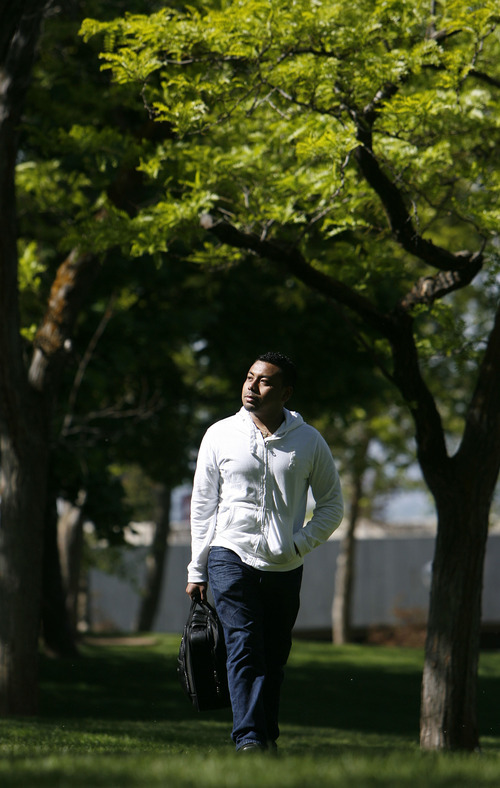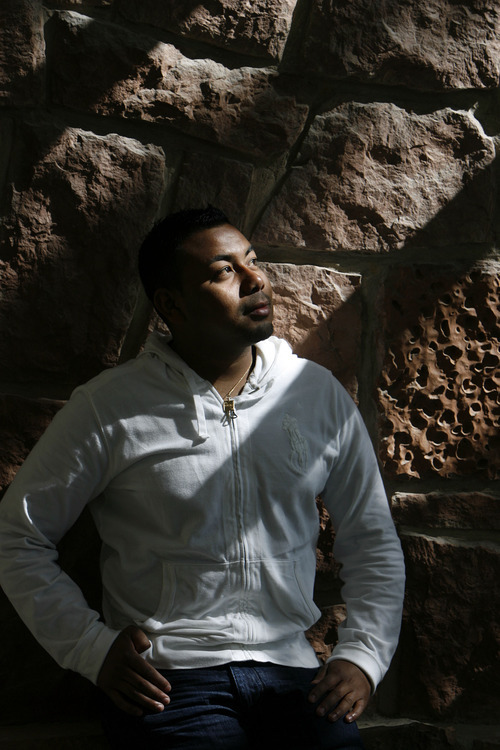This is an archived article that was published on sltrib.com in 2012, and information in the article may be outdated. It is provided only for personal research purposes and may not be reprinted.
Eduardo Reyes-Chavez was 11 when a "coyote" spirited him across the U.S. border to start a new life with his mom in Salt Lake City. At the time, he knew three words of English.
"Chicken, pen and one more I forgot," said the 2007 West High graduate.
Reyes-Chavez had to wait until he became a legal resident in 2009 to return to Mexico. By then, he was a sophomore at the University of Utah and an Honors student with a near-perfect grade-point average.
Among the 100 U. students who graduated with a degree from the University of Utah's Honors College in May, Reyes-Chavez left a deep impression on faculty and fellow students.
"He has ambition and drive, but also this huge compassion for the world. I am so inspired by his example. He has taken advantage of every opportunity that Honors College has offered and magnified them," said Martha Bradley, the U.'s former Honors dean who is now associate vice president for academic affairs.
Reyes-Chavez is applying to top law schools and plans to study constitutional, immigration and international law.
"I love the Constitution," he said. "There is nothing more I love."
Before immigrating, he lived in the small Guerrero town of Maldonado. His dad died when he was 6, and his mom, Francisca, immigrated to the United States to find work. She later had him brought to the U.S. so he could pursue a good education.
But while he lived with grandparents, he toiled in cornfields after school, looked after his younger sister and supplemented their diet by scavenging fruit and hunting iguanas.
"Living in extreme poverty gave me the strength and incentive to work for others. Now in the United States of America, I am so fortunate to have the opportunity to fulfill my ultimate goal," he wrote in a 2007 essay just before starting college at the U.
The essay, "Tú lo necesitas más," took second place in The Salt Lake Tribune's "Tell me your story" contest.
"I knew that education was my only way out," he wrote. "Six years later, my village still supports me. If I make it, I will be the first member to go to college. For that reason I promised myself that one day, Eduardo Reyes will go back, triumphant, and will help end the misery and the economic hardship of my hometown."
In college, his excellent grades opened many doors for internships, but his illegal status prevented him from leaving Utah. Reyes-Chavez and his sister obtained U.S. residency in 2009 after their mother married a legal resident.
The change gave him the freedom to pursue learning opportunities abroad. Three months later, he went to Mexico City for a summer internship with a top lobbying firm, drafting energy-reform language.
He has traveled abroad most summers, most recently to Belgium to work with the European Union.
During his senior year, he advised Salt Lake City high school students, many who arrived in Utah as undocumented immigrants, about attending college. One such student challenged Reyes-Chavez's counsel because without legal status, he would not likely obtain meaningful employment.
"I told him education is important. 'No one can ever take it from you. You can have hope,' " he said.
Reyes-Chavez expects to spend the next year working with the Utah College Advising Corps, helping recruit others from underrepresented groups into higher education. The University of Utah's Honors College, now in its 50th year, tries to replicate a small-college experience on the campus of a major public research university.





